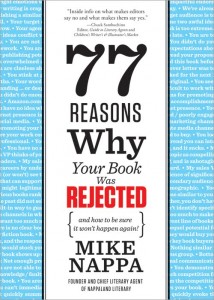What I’m Reading :: 77 Reasons Why Your Book Was Rejected
 77 Reasons Why Your Book Was Rejected by author and agent Mike Nappa (Nappaland Literary Agency) takes a hardcore look at editorial, marketing, and sales perspectives on why a book is rejected. His tone is quick-witted and conversational, and he is in no way here to hold your hand and make you feel better about your rejections. He is in-your-face (“Your Writing is Crap”), realistic (“Your Book Costs Too Much to Make”), and the helpful voice of a friend you need (“You Aren’t Able to Significantly Differentiate Your Book from the Competition”).
77 Reasons Why Your Book Was Rejected by author and agent Mike Nappa (Nappaland Literary Agency) takes a hardcore look at editorial, marketing, and sales perspectives on why a book is rejected. His tone is quick-witted and conversational, and he is in no way here to hold your hand and make you feel better about your rejections. He is in-your-face (“Your Writing is Crap”), realistic (“Your Book Costs Too Much to Make”), and the helpful voice of a friend you need (“You Aren’t Able to Significantly Differentiate Your Book from the Competition”).
Nappa follows up each of the 77 Reasons Why with “What you can do about it,” offering two or three tips for each reason. He notes early on that you may not like what he has to say, but he is being as honest as he can. The book begins, “I make it my goal to reject every book proposal you send me in sixty seconds or less.” This may sound arrogant, but keep reading: “The sad part about this goal of mine is that it’s remarkably easy to accomplish. Too easy, in fact.” Nappa himself has had numerous books published, but also received thousands of rejections, so he isn’t taking any kind of industry-moral high road here. He really is talking to readers like the friend they need to guide them through this seemingly mysterious process. This book, he says, is about “learning why we fail – and then turning that knowledge into success the next time around.” Or at least making that rejection less of a bitter pill to swallow.
Given the 77 reasons in here, only a few could be taken as personal – the rest, he points out, are purely business (which might explain why so many find it “mysterious”). Nappa offers a detailed explanation of what happens once an acquisitions editor takes a book on to pitch to the publisher. It’s not pretty, and it explains why some books never make it past that stage. “Remember,” Napa writes, “publishing is an industry – a business that has at its core the innate desire for survival. And, as for any business, survival means profit. A publishing house that doesn’t actively pursue profitability – no matter how noble or sublime its content goals – simply won’t be publishing books for very long.”
Nappa addresses reasons for rejection from three main perspectives: editorial, marketing, and sales. Some of the examples he provides from his years of experience are shockingly funny (as in, someone really did that?). But what may seem like the “right” approach from the writer trying to pitch a book is exactly what knocks that book out within those first sixty seconds of consideration. Nappa warns his readers, “I will always be honest with you in this book. Sometimes that may make you angry with me. I apologize in advance…but please don’t take it personally. I’m just trying to help you by sharing from my twenty-plus years of experience in publishing.”
Nappa welcomes readers to disagree with his advice if they have had different experiences, which is a good reminder that no one “advice” book of this kind is in any way absolute in being right or naming what is wrong. There are as many experiences with publishing as there are writers trying to get published and agents accepting or rejecting those attempts.
While it seems like this book focuses on the goal of writers who want to run with the big dogs in publishing, that might just be because of Nappa’s work experience in the more cut-throat levels of the industry. Many of his best stories (both of failures and successes) come from working with bigger publishing houses. Still, Nappa offers solid advice for ALL writers to consider, whether pitching to an agent or directly to a small, indie publisher, like those listed on NewPages.
I am personally not a writer trying to get published, but found Nappa’s book extremely insightful (in addition to entertaining), just reading about his work as an agent and acquisitions editor, and working in the industry with other major decision-makers. It’s not a book that needs to be read cover to cover; with each reason and advice on what to do about it taking only a few pages each, it’s easy to pick out specific issues of interest.
77 Reasons is available online from Sourcebooks, where you can also see the full table of contents and read an excerpt from the book.


